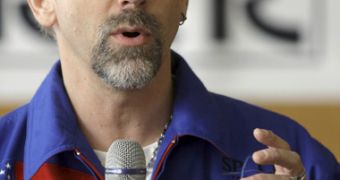Richard Garriott, son of former astronaut Owen Garriott, has recently returned from a trip to outer space, where he went along with 2 Russian professional astronauts, Sergei Volkov and Oleg Kononenko, aboard a Soyuz TMA-13 spacecraft. Richard Garriott spent 12 days in space, the largest part of which was inside the International Space Station. Due to the fact that he labels his experience as having been incredible, he would like more people to share it. In this regard, Garriott Jr. is currently taking advantage of his presence in the international spotlight, in order to conduct a small-scale campaign related to opening the outer space to the public.
In his opinion, government-run space agencies, such as NASA and Roscosmos, its Russian counterpart, should provide private entrepreneurs a larger access to the ISS, and support private space trips. Actually, Garriott Jr. has done more than simple advertising, considering that he is a board member of and investor in the US-based Space Adventures, Ltd., a company that arranges flights for cosmic tourists – of which he was the 6th to ever fly in outer space. His main purpose, and that of the firm, in fact, has always been that of putting an end to the governmental monopoly on space flights.
They have been constantly backed by a number of companies that have invested millions of dollars in their effort, but also aided by NASA's decision of grounding all space flights starting with 2010. Consequently, Russians will be the only ones able to perform such trips, but, as past declarations have indicated, they are not very eager to do so. “I hope that NASA, Roscosmos, and other partners find a way to encourage entrepreneurs such as myself, and other companies, and other countries to take advantage of this amazing resource we now have in space. I do think that current policy is not set up well to encourage that kind of entrepreneurship,” stated Garriott.
Perhaps making it possible for private individuals or companies to fly into space would actually accelerate the extraterrestrial race, and eventually broaden efforts related to outer space travels and discoveries. The rewards of this attempt could prove to be larger than estimated, since space flight technology, experiments and studies would definitely receive a great boost. “Now that I've experienced an orbit, I believe I could put together a flight program which is even more useful and I believe I could put together a set of work to be carried out in orbit which would be even more valuable,” believes Garriott himself.

 14 DAY TRIAL //
14 DAY TRIAL //